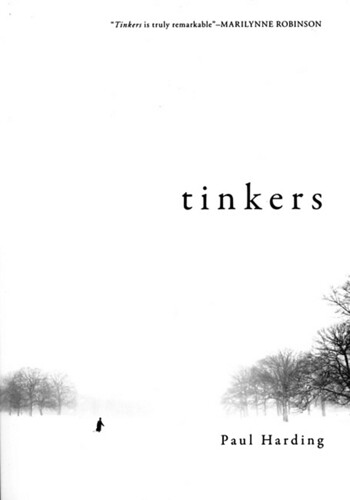 Reviewing a book that’s truly great is no trouble at all, and it’s an even simpler matter to write up one that’s absolutely terrible. The books that fall somewhere in between, those that aren’t quite ready for the canon but are by no means awful—it’s those that often prove difficult.
Reviewing a book that’s truly great is no trouble at all, and it’s an even simpler matter to write up one that’s absolutely terrible. The books that fall somewhere in between, those that aren’t quite ready for the canon but are by no means awful—it’s those that often prove difficult.
Keep the name of Paul Harding in mind; file it away on some mental bookshelf to be dusted off in 10 or 20 years, and you’ll have a great writer on your hands. Right now, however, all you’ll have is Tinkers—a rather unsteady prose-poem masquerading as a novel, an exercise in poetic description of the highest order bogged down in a plot half-stolen from Nicholas Sparks.
Tinkers isn’t a bad novel by any means. It’s fabulously written, occasionally moving and can be read in a single (albeit long) sitting, leaving the reader feeling almost as if they’ve read something great—but only almost. What Tinkers is, in short, is a promising debut novel that reads like a promising debut novel. It is no more than that but also no less.
Plot, in this case, is almost irrelevant. Of what importance is “plot” to writing that verges on expressionist poetry? The plot of Tinkers is the stage from which Harding’s prose can astound the reader, the canvas on which he can paint the word-pictures that are far more moving than the rather mundane plot devices he employs.

But a plot, unfortunately, Tinkers does have. George Washington Crosby is dying. As life slowly ebbs away, he begins to hallucinate—with increasing clarity, for those of you who might get bogged down in the first few pages’ near-unintelligibility. George’s life story mingles with that of his father, Howard Crosby, and for a few pages inexplicably with that of Howard’s father. Narration, style and point of view shift continuously, as the stories converge and diverge repeatedly, before eventually (and predictably) meeting once and for all in the book’s final pages.
It is not much of a plot, no, but it is enough of a skeleton upon which Harding can hang his beautiful words, his masterful descriptions, his page-long sentences:
“Wind swept over the plains,” Harding wries, being brief. “We never saw the caribou or the revolution. We were a burning fuse. We barely caught a glimpse of the darkening world below us before we burned away to nothing.”
It is prose, and good prose, but just barely. Break it into stanzas, fiddle with the alignment and you’re left with what would probably be one of the more touching entries in an anthology of contemporary poetry.
That said, contemporary poetry, good or bad, isn’t quite the stuff great novels are made of. You can write a good novel without much of a plot, and you can write a good novel without fantastically developed characters, and you can write a good novel without the florid verbiage employed so artfully by Harding. Until you’ve got a firm grasp on at least two of those factors, however, literary greatness will be a long time coming.
I would hardly advise Harding to abandon the novel form. He may one day write the grand, Faulknerian story that Tinkers aspires to be. That he has not yet done so is no cause for shame—and that he has proven able to toss off nearly 200 pages of beautiful language in trying is most certainly reason for hope.
Peter Chomko can be reached at pchomko@temple.edu.



Be the first to comment